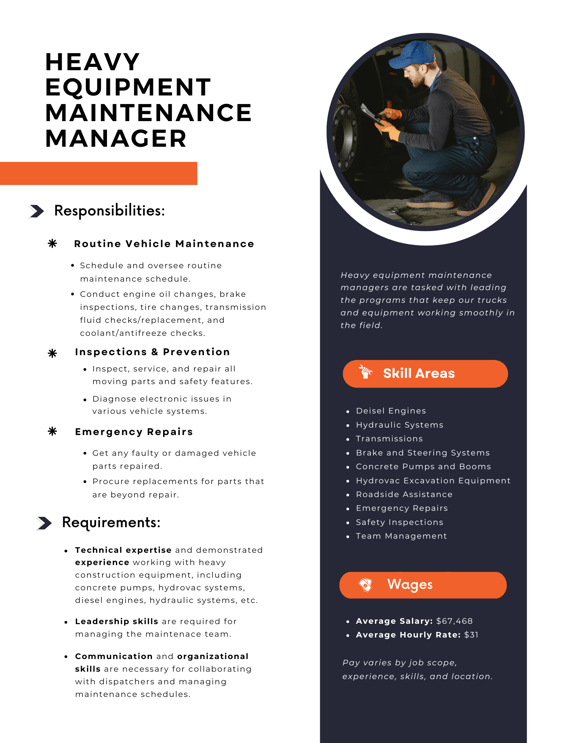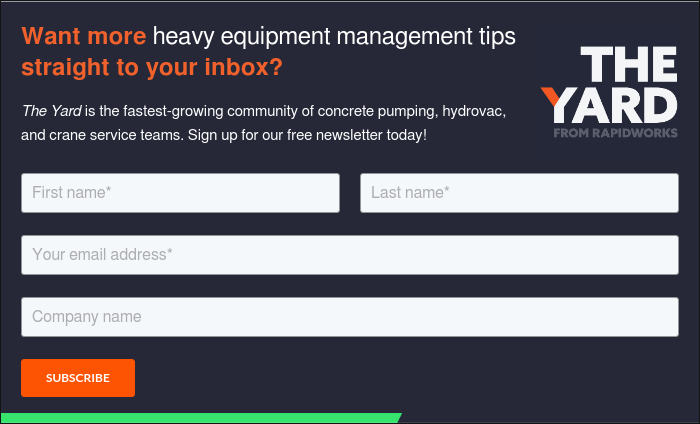Hiring the right maintenance manager for your heavy equipment fleet can feel like finding a needle in a haystack. With the pressure of keeping everything running smoothly and avoiding costly downtime, you need a leader who's not just mechanically savvy but also knows how to manage a team under tough conditions.
This hiring guide is designed to walk you through what to look for in a heavy equipment maintenance manager — someone who can ensure your machines are always job-ready and your team is operating at peak efficiency. Let's dive into the key responsibilities, skills, and experience you should be scouting for to find the best fit for your business:
What Is a Heavy Equipment Maintenance Manager?
A heavy equipment maintenance manager oversees preventative maintenance, service, and repairs for equipment like hydrovac excavation or concrete pumping trucks. They are trained to work with specialized equipment with big engines that perform demanding tasks in construction, agriculture, or exploration & production (E&P) industries.
Heavy Equipment Maintenance Manager Job Description
Heavy equipment maintenance managers are responsible for inspecting, servicing, and maintaining heavy equipment vehicles. As managers, their job includes conducting routine maintenance and equipment-specific upkeep to ensure the vehicles perform well on the field.
They have knowledge and hands-on experience in the specific fleet of heavy equipment. They should be able to identify and rectify issues on inspection, and work with mechanics on- or off-site to fix any problems.
 Check out our Ultimate Guide to Heavy Equipment Maintenance for more tips for building a successful maintenance program.
Check out our Ultimate Guide to Heavy Equipment Maintenance for more tips for building a successful maintenance program.
Heavy Equipment Maintenance Manager Responsibilities
You might want to adjust this list to include specific experience or skills with the equipment or maintenance problems you frequently face, but this should be a good place to start.
Here are the typical responsibilities of a heavy equipment maintenance manager.
- Routine engine and vehicle maintenance: Schedule and oversee routine maintenance, including engine oil changes, brake inspections, tire changes, transmission fluid checks/replacement, and coolant/antifreeze checks.
- Equipment-specific maintenance: Inspect and service equipment-specific features and systems.
- Preventative maintenance: Inspect different parts of the equipment daily, weekly, and monthly to detect potential issues early on.
- Safety inspections: Inspect, service, and repair safety features specific to the heavy equipment.
- Diagnose problems and track maintenance using software and testing equipment: Use computer programs to diagnose electronic issues in various vehicle systems. Also, should be adept at using telematics or other fleet-tracking software to monitor routine maintenance and avoid disruptions and downtime.
- Repair or replace faulty/damaged parts: Get any faulty or damaged vehicle parts repaired. Procure replacement for parts that are beyond repair.
- Supervise and collaborate with mechanics and technicians: Work with in-house or contracted heavy equipment mechanics and technicians to complete the maintenance or repair tasks on schedule.
- Keep records of maintenance: Create detailed accounts of maintenance and repair work for the heavy equipment fleet.

Heavy Equipment Maintenance Manager Salary
The heavy equipment maintenance manager salary varies based on experience and the scope of duties. They may be paid annually or on an hourly basis. Here’s the median pay for this role:
- Annual salary: $67,468
- Hourly pay rate: $31
Keep in mind that pay varies by job scope, experience, skills, and location.
Heavy Equipment Maintenance Manager Skills and Experience
Most companies don’t require a formal degree for a heavy equipment maintenance manager. However, a high school diploma or GED is typically required. More importantly, the manager must have long-term, on-the-job training, particularly with the type of heavy vehicles in the company’s fleet.
Here’s what heavy equipment companies typically look for when hiring a maintenance manager:
- Technical expertise and certification: Heavy equipment maintenance managers are expected to have acquired technical expertise in maintaining and servicing vehicles' parts and systems. They should ideally have certifications in heavy equipment or general maintenance from a technical or vocational school. They should have extensive knowledge of how the vehicles operate and how the different systems work. Additionally, they should be well-versed in the appropriate safety protocols and regulations.
- Leadership skills: As managers, they should possess leadership skills to manage the team of maintenance technicians. They often delegate tasks and coordinate maintenance activities with team members and external contractors.
- Communication and collaboration: Effective communication is essential for the timely maintenance of heavy equipment. Managers must communicate with their leaders, technicians, and vendors to ensure the fleet is well-maintained and ready for dispatch whenever required on the site.
- Organizational skills: Heavy equipment maintenance managers should be able to organize and schedule maintenance and repair tasks. They should also be able to document maintenance activities and budget for record-keeping.
- Working in tough conditions: Maintenance managers often have to be present on-site to inspect heavy vehicles. They should be physically fit enough to withstand harsh conditions on construction or industrial sites.
